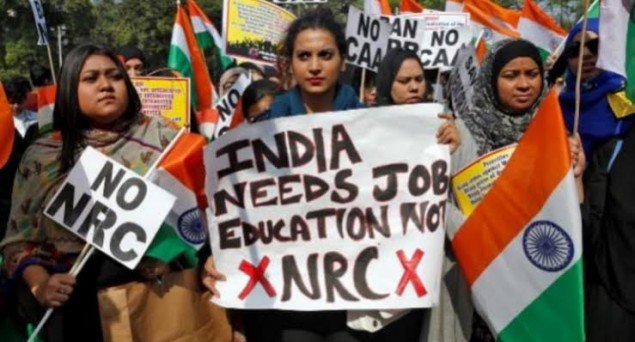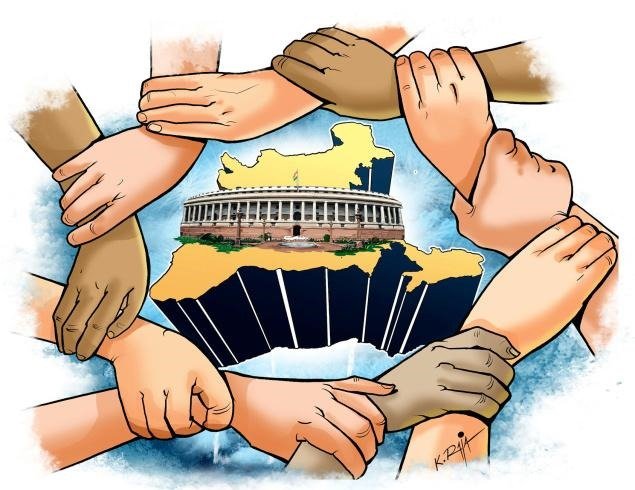By: Dipak Kurmi
In the wake of the Citizenship Amendment Act’s implementation, the prospect of instituting a National Population Register (NPR) and a National Register of Citizens (NRC) remains uncertain, subject to differing interpretations within the government. To unravel the true sequence of events, it’s essential to examine the chronological timeline closely.
Following the commencement of the Shaheen Bagh protests, Prime Minister Narendra Modi addressed a rally in Delhi on December 22, 2019. During his speech, he reassured the 1.3 billion citizens of India that since assuming office in 2014, the National Register of Citizens (NRC) had not been a topic of discussion nationwide. He emphasized that its implementation was solely confined to Assam, as mandated by directives from the Supreme Court.
Contradicting the Prime Minister’s assertion, Home Minister Amit Shah made public statements just days prior that set a different tone. On December 10, Shah unequivocally declared in Parliament, “Iss desh mein NRC hokar rahega” (there will definitely be an NRC in this nation) and urged everyone to prepare for its arrival, stating, “maan ke chaliye NRC aane wala hai” (you must assume that NRC is to come). Furthermore, during a rally in Jharkhand on December 3, he went as far as to establish a deadline for the NRC’s execution, setting it for 2024. He affirmed, “Every infiltrator will be identified and expelled before the next election.”
In his 2019 manifesto, Prime Minister Modi made a significant pledge regarding the National Register of Citizens (NRC), highlighting the profound impact of illegal immigration on the cultural and linguistic fabric of certain regions. He vowed to prioritize the completion of the NRC process in areas affected by such demographic shifts, emphasizing its importance in safeguarding the livelihoods and employment opportunities of local residents. Additionally, Modi committed to implementing the NRC gradually in other parts of the nation in the future.
In the absence of extradition treaties with Bangladesh or Pakistan, India faces a logistical challenge concerning undocumented migrants identified through the National Population Register (NPR) and National Register of Citizens (NRC). Should these individuals be located, the government’s options are limited, as there are no established means for deportation. Detention remains the primary course of action, a practice already in effect in Assam.
Just forty-eight hours following Prime Minister Modi’s address, the Union government initiated the initial phase towards implementing the National Register of Citizens (NRC). The Cabinet greenlit a significant allocation of funds, approving Rs 8,754 crores for the Census scheduled for 2021, along with an additional Rs 3,941 crores earmarked for the “updation of the National Population Register.”
During a press conference, the government downplayed the significance of the National Population Register (NPR) initiative. They emphasized that the NPR would encompass “anyone,” irrespective of citizenship status, highlighting that no documentation, proof, or biometric data would be necessary. The government conveyed a message of trust in the public, implying that participation in the NPR process would be inclusive and accessible to all.
Scheduled to commence in April 2020 and conclude by September, the National Population Register (NPR) initiative faced an unexpected halt due to the onset of the COVID-19 pandemic. Despite initial plans, the government asserted that the NPR data would not be utilized for the National Register of Citizens (NRC). In fact, Home Minister Amit Shah explicitly clarified that there was no correlation between the NPR and the NRC, stating, “Iska dur dur tak NRC se kuchh bhi sambandh nahin hai” (it isn’t remotely connected to the NRC).
A clear distinction was emphasized by Home Minister Amit Shah, delineating the roles of the National Population Register (NPR) and the National Register of Citizens (NRC). Shah underscored that while the NPR serves as a foundational database for policy formulation, the NRC is a distinct process requiring individuals to validate their citizenship status. He emphatically stated that there is no intertwining between the two processes, nor can they be utilized interchangeably. Shah reassured the populace, particularly minorities, that NPR data would not be utilized for the NRC, dispelling any rumors to the contrary.
Contrary to initial assertions, the reality surrounding the National Population Register (NPR) soon became apparent. The NPR would gather twenty-two data points, with the Modi government introducing an additional eight. These details encompassed an individual’s Aadhaar number, passport details, driver’s license information, mobile number, voter identity card details, mother tongue, as well as the date and birthplace of their parents.
The inclusion of these eight additional data points, not originally specified in the 2003 Citizenship Rules, raised questions regarding the Modi government’s intentions with the National Population Register (NPR). Reporters highlighted this discrepancy to then Union Minister Prakash Javadekar, who responded by stating that he had not yet reviewed the finalized form crafted by experts.
Subsequent research into the legal frameworks revealed a significant connection between the National Population Register (NPR) and the National Register of Citizens (NRC) – in essence, the NPR served as the groundwork for the NRC. Local officials tasked with overseeing the NPR would meticulously examine the list, flagging individuals as “doubtful citizens” based on their discretion. Those labeled as such would then be required to provide proof of their citizenship. Furthermore, once the list was made public, anyone could raise concerns or accusations against individuals or families, including anonymous submissions, thereby intensifying scrutiny over citizenship status.
News surfaced on December 24, 2019, confirming that the National Population Register (NPR) indeed formed the underlying framework for the National Register of Citizens (NRC). Section 14A of the Citizenship Act vested the government with the authority to mandate the registration of every Indian citizen and issue identity cards, subsequently maintaining a comprehensive National Register of Indian Citizens. This citizenship registry would be derived directly from the data compiled within the NPR database.
A revelation emerged when the 2018-19 annual report of Home Minister Amit Shah’s ministry was unearthed. The report explicitly stated that the National Population Register (NPR) served as the initial phase in the establishment of the National Register of Indian Citizens (NRC).
On July 8, 2014, the then Minister of State for Home, Kiren Rijiju, announced that it had been resolved to ensure the completion of the National Population Register (NPR) and proceed towards its ultimate objective – the establishment of a National Register of Indian Citizens through the verification of citizenship status for every ordinary resident listed in the NPR.
On November 26, 2014, addressing the Rajya Sabha, Kiren Rijiju reiterated that the National Population Register (NPR) served as the initial stage towards establishing a National Register of Indian Citizens by verifying the citizenship status of each regular resident. This sentiment was echoed in his parliamentary statements on July 15, 22, and 23, 2014, as well as on May 13, 2015, and November 16, 2016, consistently linking the NPR and NRC.
As the COVID-19 pandemic wanes, uncertainty looms over the current status of the National Population Register (NPR) and National Register of Citizens (NRC) following the enactment of the Citizenship Amendment Act (CAA). The lack of clarity surrounding this critical issue is concerning, as it has become obscured by ambiguous language and mixed signals. (The writer can be reached at dipakkurmiglpltd@gmail.com)







